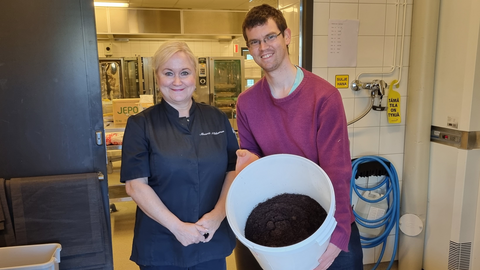Cooperation project supports local food and innovative use of surplus ingredients

Omnia, the Joint Authority of Education in the Espoo Region, and Helsieni, a company located in the Kera district, have started a cooperation project that promotes circular economy and local food production. At Omnia student restaurants, used coffee grounds are collected for Helsieni to use as substrate oyster mushrooms. Helsieni had previously cooperated with the City of Espoo, through which it also found connections for cooperation with educational institutions.
Helsieni is a circular economy company that aims to produce local and healthy food in Finland and the surrounding areas. Chris Holtslag and Stéphane Poirié from Helsieni assess that the Espoo cultures provide about 60 kilograms of mushrooms per week.
Omnia has six student restaurants that produce about 400 kilograms of inedible food waste per week, in the form of coffee grounds. For mushroom cultivation, the coffee grounds make an automatically pasteurised and nutritious substrate that is ready for use without extensive processing.
At the start of the cooperation, a representative of Helsieni came by to instruct the proper collection method for coffee grounds for them to be suitable for the oyster mushrooms. Maarit Nikkanen, supervisor of food services at the Helmi student restaurant, states that sorting the coffee grounds is easy and does not complicate the staff’s other work. All employees have been happy to collect the coffee grounds and do good for the environment. Stéphane Poirié from Helsieni also says that cooperation with Omnia has worked wonderfully.
Landscaping students at Omnia try their hand at cultivating oyster mushrooms
Some of the coffee grounds collected are also returned to Omnia as substrates for the oyster mushrooms there. Through this, Omnia students get to try out urban cultivation and increase their level of self-sufficiency. Students look after the mushrooms’ growth conditions and monitor the mushrooms’ development in various environments. The mushrooms are being grown in both enclosed cultivation spaces and outdoor planting boxes alongside herbs and flowers. The students have been excited and interested in the mushroom-growing project, says Johanna Issakainen, instructor of the landscaping study programme.
The mushrooms cultivated at Omnia will be served at the educational institution’s organic restaurant Henricus. The first oyster mushrooms have already been offered at lunch. According to Tanja Griffith, the restaurant’s service manager, the customers have given plenty of positive feedback for the mushroom dishes. The fact that they were cultivated at Omnia is a source of wonder and admiration.
What could the green transition mean for the development work in your company?
Building a carbon-neutral society requires bold thinking and new approaches. Espoo has the ability to take up this challenge. Join us in developing future solutions in Kera, Otaniemi and Kiviruukki! The Implementation Pathway for Environments that Accelerate Sustainable Growth KETO project boosts cooperation between businesses, schools and research organisations, and creates concrete development environments that promote the green transition and digitalisation. The project is run by the City of Espoo, VTT Technical Research Centre of Finland, Aalto University and Omnia, together with several business partners. Project is funded by European Union’s REACT-EU ERDF and is part of the European Union’s response to the covid-19 pandemic.